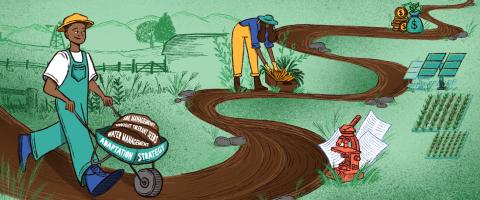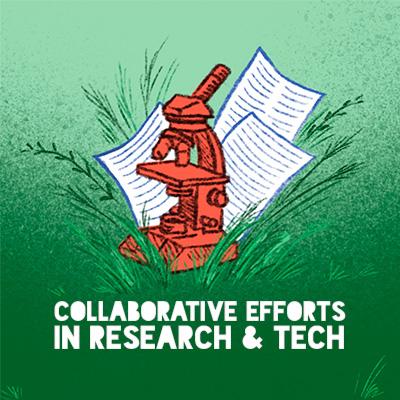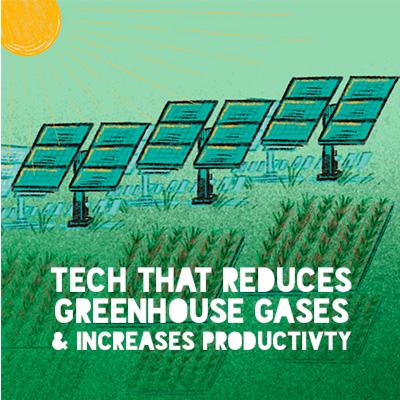Pathways to future agriculture in Africa
Pathways to future agriculture in Africa
The Africa Regional Resilience Hub, led by SouthSouthNorth (SSN), is a crucial component of the COP28 Resilience Hub. Along with several other regions, the Regional Hubs work to amplify regional voices to global decision-making spaces, with a particular focus on communities and underrepresented and lesser heard voices. This feature forms part of the Africa Regional Hubs efforts in this regard. The COP28 Resilience Hub events are all hybrid and allow for virtual attendance and participation. Register here for the Resilience Hub virtual platform.
This post first appeared on the SouthSouthNorth website.
Agriculture in Africa, particularly smallholder farming, is a sector interwoven with intricate challenges and diverse vulnerabilities. Climate change, alongside market-related shocks and various other risks, constantly tests the resilience of farmers and agricultural systems. In response to these challenges, multifaceted adaptation strategies are emerging as crucial tools for enhancing agricultural sustainability and resilience across various scales.

Exploring adaptation on different scales
Adaptation in agriculture operates on a spectrum of scales, spanning from individual farmers to regional communities. These solutions are devised to mitigate risks posed by a range of factors, including extreme weather events like heatwaves, droughts, floods, and storms, as well as market dynamics, pests, and conflicts that are prevalent in the agricultural landscape.
Adopting multi-scale strategies
To effectively address the complexities and vulnerabilities faced by farmers and agricultural systems, multifaceted adaptation strategies are paramount. These strategies are designed to operate at multiple scales, incorporating a variety of elements. For instance, combining drought-tolerant seeds with insurance can significantly boost adoption rates. Similarly, integrating farmer training and field schools with policy changes can drive sustainable practices. Moreover, linking social protection measures such as cash or in-kind support with extension services can lead to transformative shifts in agricultural practices.
Farmers need access to a bundle of services across value chains; Evidence underscores the effectiveness of combining various adaptation approaches. Bundling different strategies amplifies their impact and enhances their ability to address multifaceted challenges. For example, integrating input support with extension services can encourage diversification and the adoption of alternative crops. Similarly, aligning soil and water management practices with a holistic approach at the farm level creates a more resilient agricultural ecosystem.

Unveiling the vital role of healthy soils in agricultural sustainability: A call for enhanced investment and national commitments
The expansion of agriculture is resulting in the depletion of both soil organic carbon and essential nutrients. Thus, there's a critical necessity to advocate for sustainable agricultural practices, including conservation agriculture and other viable sustainable approaches. This has become front and center for many African governments as food security becomes an increasingly critical issue due to climate change. Soil health is central to tackling this issue, and African governments are making concerted effort to integrate this into their national policy and NDCs. According to Nigeria’s updated Nationally Determined Contribution (NDC) 2021, the AFOLU sector continues to be critical in the move to a low carbon and climate resilient economy. The President of Nigeria has raised the issue of food security as a state of emergency, and the country is prioritizing soil health as a critical piece of the puzzle. In this light, the country will host a national workshop on climate smart soil, aimed at helping stakeholders understand the Nexus between soil health, food security and climate change, and to explore the important role of to discuss how using soil health as a sustainable tool to help develop frameworks, policies and activities to mitigate and/or adapt to the changing climate to the agricultural system. The workshop is being hosted by the Federal Ministry of Environment, in partnership with the African Climate Action Partnership (AfCAP). The Coalition of Action for Soil Health (COA4SH) has been passionately advocating for the significance of soil health in fostering sustainable agriculture. They are urging governments to endorse the Soil Health Resolution, a series of pledges aimed at promoting and expanding practices that ensure soil health, acknowledging its critical role in helping to adapt to climate change, revive biodiversity, bolster water resilience, elevate food and nutrition security, and preserve both natural and cultural heritage.

During a Africa Climate Week in Nairobi, at a side event on Dr Elliott Dossou-Yovo from AfricaRice reiterated the paramount importance of fostering robust partnerships in the realm of agricultural transformation. Firstly, collaborative efforts in agricultural research and technology capacity building can drive innovation and enhance knowledge exchange. Secondly, it is imperative to develop pilot business models that prioritize job creation for women and youth, promoting inclusivity and economic growth. Thirdly, research should focus on developing technologies that not only reduce greenhouse gas emissions but also enhance productivity, while systematic monitoring of emissions can furnish crucial data for evidence-based policymaking. Lastly, creating enabling conditions for widespread technology adoption, including access to extension services and education, is essential for scaling sustainable agricultural practices. Through these interconnected initiatives, we can forge a pathway towards a more sustainable and productive agricultural landscape.

Conclusion
The future of agriculture in Africa necessitates a synergistic and multidimensional approach to adaptation. Embracing multifaceted strategies that operate across different scales is imperative to effectively manage risks and bolster the agricultural sector's resilience. By combining diverse solutions and aligning them with farmers' needs and local contexts, we can pave the way for a more sustainable and robust agricultural landscape that empowers farmers and ensures food security for generations to come.

